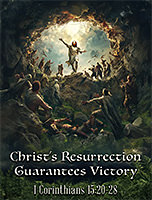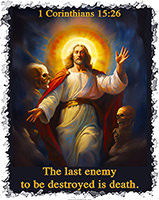First Corinthians 15:12–34 . . .
The Resurrection of the Dead
Apostle Paul’s whole point in today’s passage is that if there’s no heaven and the resurrection is a sham, life is an exercise in futility. If the bodily resurrection is only an empty dream and this life is all there is, Christians are to be pitied. Fortunately, Paul will argue that this life today isn’t all there is.
In this passage, Paul will provide three key results of Christ’s resurrection.
1) Christ’s resurrection provides hope (15:12–19, see this passage at the bottom of the page) In these eight verses, Paul claims that if we have no future, we have no past or present. That is, we have no forgiveness of our sins in the past and no advantage over unbelievers in the present. He asked his opening question because the Corinthians argued that there was no future physical resurrection; they were denying that believers will experience resurrection. Paul’s logic is clear in v. 12: Since Christ has been raised, resurrection obviously is possible. In this chapter, Paul insists that the resurrection isn’not merely possible, it’s absolutely certain and essential to our faith. However, before Paul can drive home this point, he’ll concede the possibility that Christ hasn’t risen. In vv. 13–19, he discloses seven disastrous consequences if there were no resurrection from the dead.
After Paul’s speculation, he’s ready to move on to the next step: the glorious consequences of the fact that Christ has been raised from the dead. He turns his focus from the negative consequences (vv. 12–19) to the positive consequences of the resurrection (vv. 20–28). In the next nine verses, he’ll argue that…
2) Christ’s resurrection guarantees victory (vv. 20–28) In these next nine verses, Apostle Paul demonstrates how Christ’s resurrection makes the resurrection of believers both necessary and inevitable. All those who are “in Christ” must arise because Christ arose. His miraculous resurrection set in motion the defeat of all God’s enemies, including death, thereby demanding our resurrection; otherwise death would remain undefeated.
The imagery of “firstfruits” (vv. 20 and 23) recalls the Feast of First Fruits in the Old Testament (highlighted in Exodus 23:16 and Leviticus 23:9–14). On that day, at the beginning of the grain harvest, Israelites brought the first sheaf harvested, dedicating it to the Lord. This offering assured the Israelites that the rest of the harvest would follow. Christ is the “firstfruits” of the resurrection — the first person to be raised from the dead permanently. His resurrection assures us that someday there will be a complete harvest.
After touching upon the victory that God and the believer will enjoy because of Christ’s resurrection, Paul next affirms its purpose and motivating power.
3) Christ’s resurrection gives purpose (vv. 29–34) In these final verses, Paul insists that the resurrection motivates appropriate responses. To start with, v. 29 can be most-confusing: “Now if there is no resurrection, what will those do who are baptized for the dead? If the dead are not raised at all, why are people baptized for them?” When we exams that verse, it becomes apparent: Scriptures clearly teach that after death comes judgment (Hebrews 9:27), not a second chance, in the event someone happens to be baptized for you.
Next, Paul gives two incentives for the resurrection: service (vv. 30–32) and sanctification (vv. 33–34). In these first three verses, Paul explains that the reason he served God was because he had personal assurance of his body’s resurrection. He went through incredible suffering and pain in the course of his ministry; if there were no resurrection of the dead, he’d have been foolish to risk his life for nothing.
This passage closes in vv. 33–34 with a series of Paul’s commands: Don’t be misled; come back to your senses; and stop sinning. He commands the Corinthians to stop being deceived, then quotes a well-known cliché. “Bad company corrupts good character.” God’s people are susceptible to deception, especially from friends and fellow church members. It’s dangerous to keep company with fellow Christians who aren’t characterized by consistent Christian living. In my opinion, hanging around with people who claim to know Christ, but who are themselves far from the Lord, can be more dangerous than spending time with non-Christians.
Paul commands the church to be sober-minded and stop sinning. What you believe about the resurrection, Paul says, controls how you live your life, how you spend your money, and how you use your time — how you invest yourself.
Note: 1st Corinthians challenges believers to examine every aspect of their lives through the lens of the Gospel. In chapters 15–16, Paul presents these two lessons:
The resurrection of Christ (ch. 15) | Collections for the Lord’s people (ch. 16)
› Watch BibleProject’s superb animated video (1 minute) that highlights Paul’s messages in these two chapters.
† Summary of 1 Corinthians 15:12–34
In this follow-up passage of chapter 15, Paul addresses the importance of Christ’s resurrection and its implications for believers, as follows:
• The Centrality of Christ’s Resurrection
Paul emphasizes that Christ’s resurrection is foundational to the Christian faith. He argues that if there’s no resurrection of the dead, then Christ hasn’t been raised, And, and if Christ hasn’t been raised, then the Christian faith is futile.
• Implications of Denying the Resurrection
In vv. 12–18, Apostle Paul outlines the consequences of denying the resurrection.
† Preaching would be in vain.
† Faith would be useless.
† The apostles would be false witnesses.
† Believers would still be in their sins.
† Those who’ve died in Christ would be lost.
• The Order of Resurrection
In vv. 20-26, the apostle describes the order of resurrection:
† Christ as the firstfruits.
† Those who belong to Christ at his coming.
† The end, when Christ hands over the kingdom to Father God.
• Victory Over Death
Then in vv. 26–28, Paul proclaims Christ's ultimate victory over all enemies, including death itself.
• Practical Implications
† The practice of baptism for the dead (v. 29)
† The apostles’ willingness to face danger for the sake of the gospel (v. 30)
† The futility of such a worldly focus if there’s no resurrection (vv. 32–34)
• Call to Righteousness
The apostle Paul concludes this section with a call to the Corinthians to come to their senses and stop sinning, reminding them of the reality of the resurrection.
This passage underscores the centrality of the resurrection in Christian theology and its profound implications for believers’ faith and conduct.
- Q. 1 What false teaching was being spread among the Corinthians (v. 12)?
- Q. 2 Paul says, “I die every day,” referring to his willingness to sacrifice his present rights for the salvation of others (knowing that he’ll be raised from the dead). In what ways do you “die every day”?
- Q. 3 The resurrection of Christ radically changed Paul’s life (vv. 29–34). Has it truly changed your life? If so, how do you consciously live your life differently in light of the fact that Christ has risen?
1 Corinthians 15:12–34
New International Version (NIV)
[You can view it in a different version by clicking here; you can also listen to this chapter.]
The Resurrection of the Dead
12But if it is preached that Christ has been raised from the dead, how can some of you say that there is no resurrection of the dead? 13If there is no resurrection of the dead, then not even Christ has been raised. 14And if Christ has not been raised, our preaching is useless and so is your faith. 15More than that, we are then found to be false witnesses about God, for we have testified about God that he raised Christ from the dead. But he did not raise him if in fact the dead are not raised. 16For if the dead are not raised, then Christ has not been raised either. 17And if Christ has not been raised, your faith is futile; you are still in your sins. 18Then those also who have fallen asleep in Christ are lost. 19If only for this life we have hope in Christ, we are of all people most to be pitied.
20But Christ has indeed been raised from the dead, the firstfruits of those who have fallen asleep. 21For since death came through a man, the resurrection of the dead comes also through a man. 22For as in Adam all die, so in Christ all will be made alive. 23But each in turn: Christ, the firstfruits; then, when he comes, those who belong to him. 24Then the end will come, when he hands over the kingdom to God the Father after he has destroyed all dominion, authority and power. 25For he must reign until he has put all his enemies under his feet. 26The last enemy to be destroyed is death. 27For he “has put everything under his feet.” Now when it says that “everything” has been put under him, it is clear that this does not include God himself, who put everything under Christ. 28When he has done this, then the Son himself will be made subject to him who put everything under him, so that God may be all in all.
29Now if there is no resurrection, what will those do who are baptized for the dead? If the dead are not raised at all, why are people baptized for them? 30And as for us, why do we endanger ourselves every hour? 31I face death every day — yes, just as surely as I boast about you in Christ Jesus our Lord. 32If I fought wild beasts in Ephesus with no more than human hopes, what have I gained? If the dead are not raised,
“Let us eat and drink, for tomorrow we die.”
33Do not be misled: “Bad company corrupts good character.” 34Come back to your senses as you ought, and stop sinning; for there are some who are ignorant of God — I say this to your shame.



